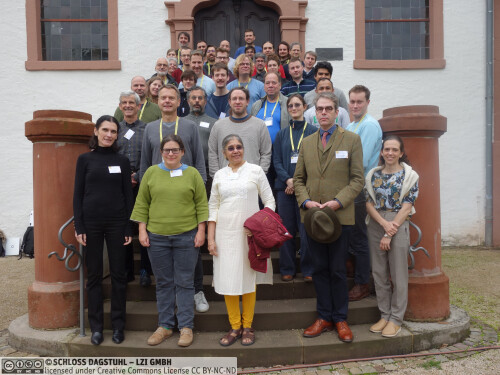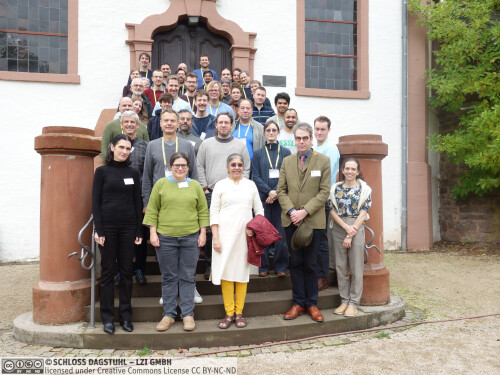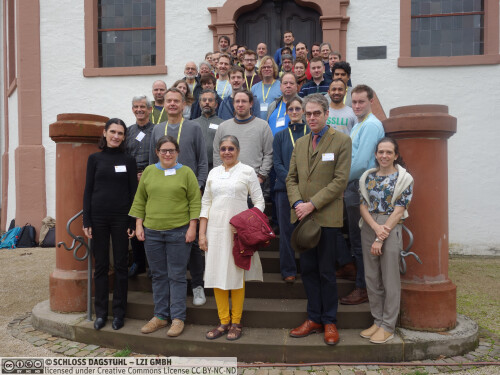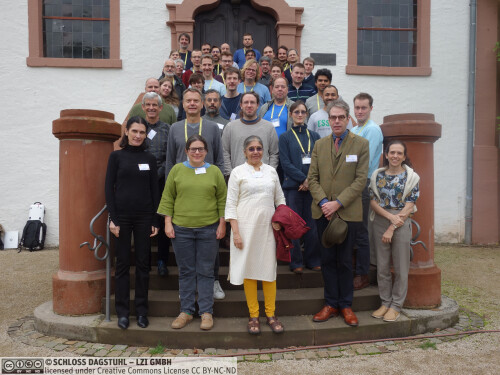Dagstuhl Seminar 24421
SAT and Interactions
( Oct 13 – Oct 18, 2024 )
Permalink
Organizers
- Olaf Beyersdorff (Friedrich-Schiller-Universität Jena, DE)
- Laura Kovács (TU Wien, AT)
- Meena Mahajan (The Institute of Mathematical Sciences - Chennai, IN)
- Martina Seidl (Johannes Kepler Universität Linz, AT)
Contact
- Andreas Dolzmann (for scientific matters)
- Susanne Bach-Bernhard (for administrative matters)
Shared Documents
- Dagstuhl Materials Page (Use personal credentials as created in DOOR to log in)
Schedule
The problem of deciding whether a propositional formula is satisfiable (SAT) is one of the most fundamental problems in computer science, both theoretically and practically. Due to its practical implications, intensive research has been performed on how to solve SAT problems in an automated fashion, and SAT solving is now a ubiquitous tool to solve many hard problems, both from industry and mathematics.
There are many generalizations of the SAT problem to further logics, including quantified Boolean formulas (QBFs), modal logics, and temporal logics. These logics present even harder satisfiability problems as they are associated with complexity classes such as PSPACE, which encompasses NP. Nevertheless, the last decade has seen the development of practically efficient algorithms for QBFs, SAT modulo theories (SMT), and further logics and their implementation as solvers, which successfully solve huge industrial instances. Since QBFs, SMT, modal logics, and temporal logics can express many practically relevant problems far more succinctly, they apply to even more real-world problems from artificial intelligence, bioinformatics, verification, and planning.
SAT is also increasingly being applied in logics that are not decidable, particularly in the context of first-order theorem proving. Here, fast SAT solvers are used for reasoning sub-tasks and for guiding the theorem provers.
The main aim of this Dagstuhl Seminar is to bring together researchers from different areas of activity on SAT and researchers that work in the field of first-order theorem proving so that they can communicate state-of-the-art advances and embark on a systematic interaction that will enhance the synergy between the different areas.
 Olaf Beyersdorff, Laura Kovács, Meena Mahajan, and Martina Seidl
Olaf Beyersdorff, Laura Kovács, Meena Mahajan, and Martina Seidl
Please log in to DOOR to see more details.
- Albert Atserias (UPC Barcelona Tech, ES) [dblp]
- Olaf Beyersdorff (Friedrich-Schiller-Universität Jena, DE) [dblp]
- Ilario Bonacina (UPC Barcelona Tech, ES) [dblp]
- Florent Capelli (University of Artois/CNRS - Lens, FR) [dblp]
- Leroy Nicholas Chew (TU Wien, AT) [dblp]
- Anupam Das (University of Birmingham, GB) [dblp]
- Susanna de Rezende (Lund University, SE) [dblp]
- Katalin Fazekas (TU Wien, AT) [dblp]
- Mathias Fleury (Universität Freiburg, DE) [dblp]
- Pascal Fontaine (University of Liège, BE) [dblp]
- Marlene Gründel (Friedrich-Schiller-Universität Jena, DE)
- Clemens Hofstadler (Universität Kassel, DE) [dblp]
- Kaspar Kasche (Friedrich-Schiller-Universität Jena, DE)
- Phokion G. Kolaitis (University of California - Santa Cruz, US) [dblp]
- Wietze Koops (Lund University, SE & University of Copenhagen, DK)
- Konstantin Korovin (University of Manchester, GB) [dblp]
- Laura Kovács (TU Wien, AT) [dblp]
- Massimo Lauria (Sapienza University of Rome, IT) [dblp]
- Meena Mahajan (The Institute of Mathematical Sciences - Chennai, IN) [dblp]
- Barnaby Martin (Durham University, GB) [dblp]
- Stefan Mengel (CNRS, CRIL - Lens, FR) [dblp]
- Claudia Nalon (University of Brasília, BR) [dblp]
- Jakob Nordström (University of Copenhagen, DK & Lund University, SE) [dblp]
- Tomáš Peitl (TU Wien, AT) [dblp]
- Florian Pollitt (Universität Freiburg, DE)
- Michael Rawson (TU Wien, AT) [dblp]
- Adrian Rebola-Pardo (TU Wien, AT & Johannes Kepler Universität Linz, AT) [dblp]
- Rahul Santhanam (University of Oxford, GB) [dblp]
- Dominik Alban Scheder (TU Chemnitz, DE) [dblp]
- Tanja Schindler (Universität Basel, CH) [dblp]
- Stephan Schulz (Duale Hochschule Baden-Württemberg - Stuttgart, DE) [dblp]
- Martina Seidl (Johannes Kepler Universität Linz, AT) [dblp]
- Friedrich Slivovsky (University of Liverpool, GB) [dblp]
- Luc Spachmann (Friedrich-Schiller-Universität Jena, DE) [dblp]
- Martin Suda (Czech Technical University - Prague, CZ) [dblp]
- Stefan Szeider (TU Wien, AT) [dblp]
- Neil Thapen (The Czech Academy of Sciences - Prague, CZ) [dblp]
- Cesare Tinelli (University of Iowa - Iowa City, US) [dblp]
- Jacobo Torán (Universität Ulm, DE) [dblp]
- Sophie Tourret (INRIA Nancy - Grand Est, FR) [dblp]
- Marc Vinyals (University of Auckland, NZ) [dblp]
- Heribert Vollmer (Leibniz Universität Hannover, DE) [dblp]
- Andrei Voronkov (University of Manchester, GB) [dblp]
Related Seminars
Classification
- Artificial Intelligence
- Computational Complexity
- Logic in Computer Science
Keywords
- satisfiability problems
- computational and proof complexity
- combinatorics
- first-order logic
- solvers for satisfiability problems
- non-classical logics





 Creative Commons BY 4.0
Creative Commons BY 4.0
